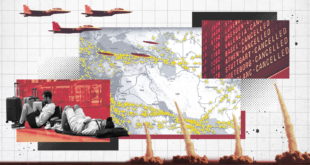GENEVA (AP) — Most Lebanese refugees have left Syria for home, shifting aid workers’ focus to providing clean water, food, shelter materials and other essentials to help them re-establish their lives, UN officials said.
“There’s been a phenomenal, speedy return of displaced Lebanese to their homes, both from Syria and within Lebanon,†said Jennifer Pagonis, spokeswoman of the UN High Commissioner for Refugees.
More than 107,000 of the 180,000 refugees in Syria had returned over official border points, and many more had crossed by unofficial routes, Pagonis said Friday.
“This has left just a few vulnerable cases remaining in some families whose men have gone back to check out the situation,†she said. “The public shelters are now virtually empty. We don’t have any official estimation of those who are still staying with host families. But the country has just literally emptied out of Lebanese going home.†Pagonis said the same situation applies within Lebanon itself, with all the public buildings that had been used as shelters now virtually empty.
Wivina Belmonte, spokeswoman for the UN Children’s Fund, said, however, “there’s a lot of work to be done†before reconstruction can begin, with the focus over the next six to 12 weeks on relief and early recovery.
“There has been a lot of shelling for about a month,†Belmonte told reporters. “Now we are at the stage where we can see exactly what has happened, whether it is to hospitals, whether it’s to schools, whether it’s to homes.
We are also a position where we can move supplies in. The supplies that we’ve been desperately trying to move in particularly in the south for about a month are getting in various stages and at various speeds.†Initially, the emphasis is on medical supplies, fuel, food and water, she noted.
“Fuel for a hospital is like oxygen for a human being,†Belmonte said. “You’ve got to have it there. Clean water is also just a basic, basic, basic way to get started again.†Christiane Berthiaume, of the UN World Food Programme, said the agency had shipped 334 truckloads of relief supplies within Lebanon, enough to feed half a million people for two weeks.
“We estimate that 200,000 displaced people have returned to south Lebanon and another 200,000 to other areas south of capital Beirut,†Berthiaume said. “At this rate, everyone will be home in a week to 10 days. But at the same time people will be going back to nothing. Many houses have been destroyed.â€
Teams of relief workers also have been handing out supplies to returning refugees at border points, Belmonte said.
“We know that when people are going to get back to their homes, some homes will have been bombed and are non-existent anymore,†she said. “So the best thing we can do is to make sure that people are going to have what they need.
UNHCR is moving to provide emergency and temporary shelter to people in the south, and is participating in a five-day assessment mission led by the Lebanese government to determine the situation in the south and give a better idea of the needs, Pagonis said.
Belmonte said a ship that arrived in Beirut from Marseille, France, on Thursday evening had already been unloaded of relief supplies. Included in the shipment were 18 tonnes of emergency rations, including special food items designed to provide children with essential nutrients.
“It’s one example of an all-out humanitarian push that’s going on right now by sea, air and land, to restore lives and livelihoods,†Belmonte said. Major weekend deliveries of water and family water-treatment kits are planned in Tyre and Marjayoun, she added.
The International Committee of the Red Cross said most of the inhabitants of Tyre had been able to move back into their apartments and houses rapidly even though some lacked electricity and water.
“The situation is entirely different for many of those who fled the towns and villages further south,†an ICRC statement said. “The level of destruction varies drastically from one place to another. While filling stations, industrial complexes, commercial malls and private homes have borne the brunt of the fighting, hospitals and dispensaries have also been damaged. One orphanage run by a local religious charity was entirely flattened by bombs.†Progress is being made in cleaning up unexploded bombs and other ordnance left over from the Israeli-Hizbollah fighting, but returnees and relief workers alike are still endangered by large amounts that remain, officials said.
“The problem of antipersonnel mines is very serious,†said UN spokeswoman Marie Heuze. “Land mines have already cost the lives of two children who returned to the south of Lebanon.†Two civilians were injured in another village but could be rescued, she said.
The cleanup of explosive devices has begun in Tibrin, a hotly contested village near the border town of Bint Jbail, officials said.
“The main street of a residential neighbourhood is littered with unexploded ordnance dropped in the last few days of the fighting,†the ICRC said. “Some of the deadly devices lay strewn in front of a hospital and the local branch of the Lebanese Red Cross. Many more are buried in the rubble of collapsed buildings.â€
 Eurasia Press & News
Eurasia Press & News


